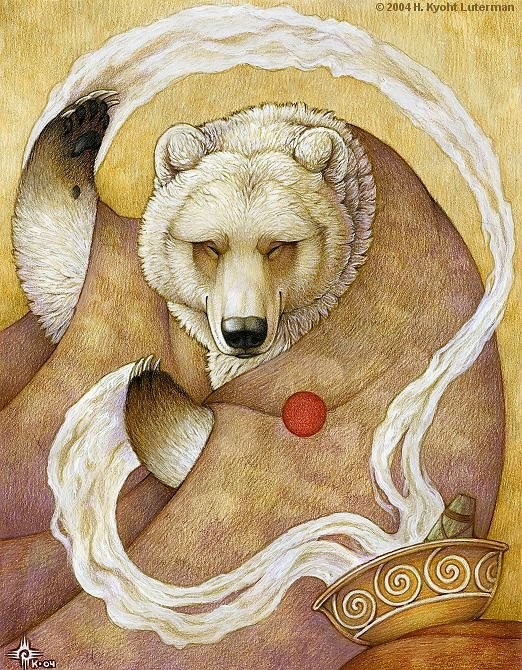Sioux
A boy went on a turtle hunt, and after following the different streams for hours, finally came to the conclusion that the only place he would find any turtles would be at the little lake, where the tribe always hunted them.
So, leaving the stream he had been following, he cut across country to the lake. On drawing near the lake, he crawled on his hands and knees in order not to be seen by the turtles, who were very watchful, as they had been hunted so much. Peeping over the rock he saw a great many out on the shore sunning themselves, so he very cautiously undressed, so he could leap into the water and catch them before they secreted themselves. But on pulling off his shirt one of his hands was held up so high that the turtles saw it and jumped into the lake with a great splash.
The boy ran to the shore but saw only bubbles coming up from the bottom. Directly the boy saw something coming to the surface, and soon it came up into sight. It was a little man, and soon others, by the hundreds, came up and swam about, splashing the water up into the air to a great height. So scared was the boy that he never stopped to gather up his clothes but ran home naked and fell into his grandmother's tent door.
"What is the trouble, grandchild," cried the old woman. But the boy could not answer. "Did you see anything unnatural?" He shook his head, "no." He made signs to the grandmother that his lungs were pressing so hard against his sides that he could not talk. He kept beating his side with his clenched hands. The grandmother got her medicine bag, made a prayer to the Great Spirit to drive out the evil spirit that had entered her grandson's body, and after she had applied the medicine, the prayer must have been heard and answered, as the boy commenced telling her what he had heard and seen.
The grandmother went to the chief's tent and told what her grandson had seen. The chief sent two brave warriors to the lake to ascertain whether it was true or not. The two warriors crept to the little hill close to the lake, and there, sure enough, the lake was swarming with little men swimming, about, splashing the water high up into the air. The warriors, too, were scared and hurried home, and in the council called on their return told what they had seen. The boy was brought to the council and given the seat of honor (opposite the door) and was named "Wankan Wanyanka" (sees holy).
The lake had formerly borne the name of Truth Lake, but from this time on was called, "Wicasa-bde" -- Man Lake.



